#but the possiblity intrigues me
Explore tagged Tumblr posts
Text
Premier League teams being approached to participate in an anti-bullying campaign and Jamie and Nate somewhat suprisingly volunteering to do a bit for Richmond together. And like that’s… nice?... but. Eh. Nate makes some sense, sure, even if his track record of treating others well has been – ahem – bumpy, but Jamie…
“Jamie bullied people,” Jan Maas is predictably the one to eventually point out while everyone else is thinking of how to bring that up. “Everybody knows that. I know that, and I wasn’t even on the team when it happened.”
“Yeah, I’m sorry, babe,” Keeley says apologetically. “It’s a really nice thought, but you do have a bit of a reputation and—“
“No, but that’s the point, babe,” Jamie says eagerly, not deterred in the slightest. “Nate and me, we know what it’s like being shit to others, yeah? So we figured, maybe we talk about that, like what made us start being shit, and what made us stop, and maybe it’ll help others figure out how to stop people from being shit? Or if you are a bully, how to fucking get your shit together and stop being a prick.”
“That’s right,” Nate agrees. He’s both very nervous and very keen. “We thought it might be a, a new perspective.” He and Jamie’s had some initially awkward but good conversations about that since Nate came back to Richmond (touching on how devastatingly easy it can be to slip from bullied to bully, the enabling silence or active support of the crowd, and learning new ways to feel big without making others feel small). Once they heard about the campaign they started talking about maybe taping such a conversation, put it out there, see if it can be of some use.
And Keeley asks them if they are sure (and Roy asks Jamie the same at some lenght) because that’s some pretty personal stuff they want to put out there, and there might be a backlash, but they’re both determined. “It’s taking responsibility, like,” Jamie notes. “Making amends, yeah?”
And of course there is some backlash, because when is there not in this loud and polyphonic world, but mostly their rather heartfelt and earnest talk is received very well.
(This whole thing maybe also leads to Jamie and Sam actually talking about the stuff that went down when they both first came to Richmond, because for all that they’re great friends now, they haven’t ever really touched that. Hey, maybe Colin and Isaac do some soul-searching too! Lots of fun introspection for everyone!)
#can i haz some more nate and jamie bonding over being reformed pricks#please and thank you#not sure i see them being willing to put themselves out there like this to be honest#but the possiblity intrigues me#jamie tartt#nathan shelley#my stuff
70 notes
·
View notes
Text














Lokius + touch in season 2 / (season 1)
#lokius#mobius#loki#mcuedit#marveledit#lokiedit#owen wilson#tom hiddleston#marvel#owenwilsonedit#dianagifs#okay for starters had to make this bc LOOK AT THEM#but y'all please can we talk about the differences between the two seasons my god!!!!#in s1 they gravitate toward each other so naturally but there's such an... idk. calculated casualness in their initial interactions#testing the waters of intrigue if you will??#'would you let me close enough to -' or 'how would you react when-' then 'what happens if i -'#and almost always stolen away from the eyes of others before realizing the magnitude of what they've built#then because of it in s2 the care and confidence in how they don't even hesitate to reach out and take what's theirs is INSANE#in front of everyone and all they've ever known they don't just want but NEED to show what they mean to each other#to not only reach out but hold on as long as possible...#how they ground center and balance#and most importantly no one matters above or can get in the way of doing exactly that they make me feel every emotion and then some 😭😭
457 notes
·
View notes
Text

Omg that would be absolutely brutal if Val only cared about the sexual aspect of their relationship?? 💀 I had to draw it
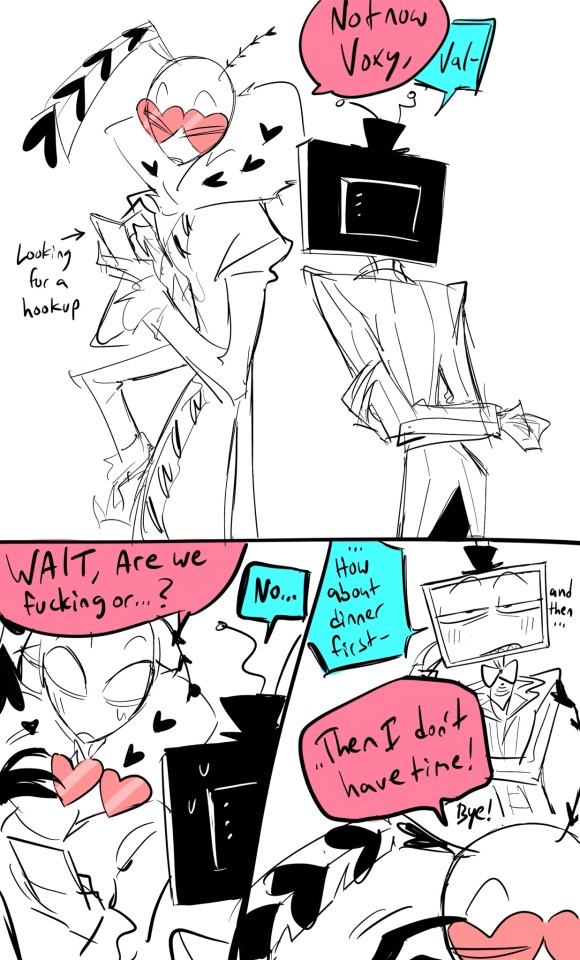
#I do like any possible dynamic with Vox so this one intrigues me too#ty for the ask<3#staticmoth#voxval#doodlez#valentino hazbin#vox hazbin#one sided staticmoth
606 notes
·
View notes
Text
February Fiction Fight
The easiest writing challenge, on the shortest month! The only goal is to write "a bit of something" each day.
Something. Anything. A cool scene that doesn't have a full story to fit into yet. A plot twist that would be great several books into a series. A description of the visuals in that one cool movie. A conversation between your favorite characters about an unlikely food combination.
A page, a paragraph, a sentence. What's that cool story you're going to write someday? Jot down what you know so far. Maybe you'll know more tomorrow. Or maybe you'll be off and running with some other fascinating concept.
No limits, no minimum wordcount! Just write a bit of something.
You play February Fiction Fight by writing each day (or as many days as you can; no shame in being busy).
You win by having more fun than everybody else.
I plan to have an absolute blast!
#Who's with me??#*crowd cheers*#Go! Write! Win!#February Fiction Fight#aka February Fracas#writeblr#writblr#writing community#some irl writer friends of mine made it up years ago#it's been a stealth event for years#this time I want to see how many other writerly types I can get onboard#because I assure you#it is great#fun to do and satisfying to look back on#several of my November Novels started as silly little ideas I was playing with back in February#it never feels like work#it's just tinkering with the fascinating concepts#with utter freedom to pursue any passing fancy#and what do you know; some of them stick around#I love going back and reading even the ones that didn't amount to more#because they're such intriguing glimpses of possibility#writer life#there are so many stories to tell#this is a great way to microdose having time to do it all#onwaaaard!
52 notes
·
View notes
Text
they shouldn't have made this bitch attractive
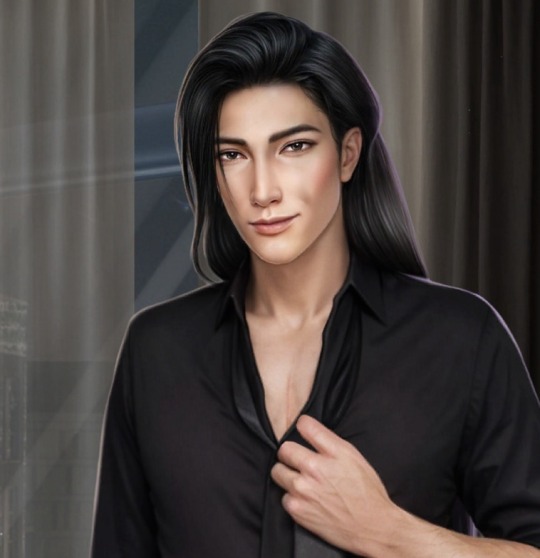
#romance club#rc garden of eden#rc goe#rc dong hyun#possible spoilers? ->#im obviously on a loyal path but god he intrigues me#wbk he isn't trustworthy since he first appeared but to this day i still can't figure him out#its always one step forward and three steps back#(reference intended)
29 notes
·
View notes
Text
so does a duchess and a likely main person of interest still get to graduate from war college or
#does that not matter since she’s already in the center of the war#very intrigued about how basgiath will play into book 4#good thing i’ve got two years to consider the possibilities#onyx storm spoilers#the empyrean#the empyrean spoilers#violet sorrengail#also they’re keeping their last names sorry#the kids can hyphen but I think xaden and violet will just stay what they are#I mean idk he did say he would take her name though#Xaden sorrengail??????#okay wait tell me more#onyx storm
42 notes
·
View notes
Text
PAUL McCARTNEY: There was some comment I read in the press recently where someone wrote “In the mood Lennon was in when he wrote this he certainly wouldn’t have wanted McCartney to get his mitts all over it”, you know, the old chestnut. In actual fact, the journalist has got his history wrong. What he means is, “In the mood John was in a couple of years before he wrote it, he might not have wanted McCartney to get his hands on it…”. Which brings me to something I remembered when reading that: John phoned me once to try and get the Beatles back together again, after we’d broken up. And I wasn’t for it, because I thought that we’d come too far and I was too deeply hurt by it all. I thought, “Nah, what’ll happen is that we’ll get together for another three days and all hell will break loose again. Maybe we just should leave it alone.”
Q: But the press, the media, outsiders, are always at least one step behind. We know what you’ve said in your last interview and so might think that you’re all getting on great, but last night you might have had an incredibly awkward phone call. Or, we might think you’re not talking to each other but last night you might have had a wonderfully happy phone call. We just don’t know how it really is between you guys. And the journalist you’re talking about certainly couldn’t have known what John was thinking.
PM: That’s right. That’s the point. In which case, why did he write it? He could have written, “I speculate, that possibly, from what we heard about John, around about that time he might not have wanted Paul to get his mitts on it…” In actual fact, I think John would have been very happy, but that’s a guess. And it’s my guess. And I think it’s an educated guess, and I’m pretty confident about that. As you say, I know what the last phone calls were about, and that is one of the saving graces, to this day, for me, that we had healed our wounds before he died. I really don’t know how we’d be dealing with it now if we hadn’t. I think it would be ten times more difficult.
— Paul McCartney, Interview for Club Sandwich, November 1st 1995
#ok I posted a smaller bit of this earlier#but the full excerpt intrigues me#he slips into saying we at the end#even though he literally could not be possibly talking about someone besides himself#also the phone call where john wants to reform the beatles???#I know I already posted that excerpt but I'm still reeling#paul mccartney#john lennon#the beatles#beatles#my quotes
34 notes
·
View notes
Text
Still thinking about the stark contrast between the general grim, highly-restrained stoicism of TotK Ganondorf’s human form compared to the exaggerated, rapidly shifting moods of “Yippee! :D Whee!! :DD Wahoo!!! :DDD *does a cute little backflip*” and “YOU STOP RUINING MY FUN RIGHT NOW OR I WILL THROW A BIG DIVO TEMPER TANTRUM AND WRECK EVERYTHING!” of his Demon King form.
Guy’s pretty obviously repressed as hell, and I think that’s one of the reasons he always goes off the rails the second he gets a chance to step out of his ceremonial One Special Man role. However, the fact that what he’s repressing feels so…childish, even the violent parts…I’m wondering if the guy ever got the chance to be a child when he was actually little.
Maybe he got yelled at and punished for making simple inexperienced baby mistakes the way Zelda was because he was under similar pressure to Fix Everything and symbolically parent all his adult subjects/family members as a Symbol of Hope that could soothe their fears and anxieties on-demand. (Not to mention Buliara’s mom raised a bit of a red flag about authoritarian parenting styles being common in Gerudo military families). Only instead of just suppressing everything and standing perfectly still and quiet in public while floundering in private like Zelda did, he got extremely skilled at convincing the people around him he was the mature, unflappable, strong, comforting, and eternally available collective cultural father-figure who’d guide them out of the hard times they were trying to hammer him into.
Only…that wasn’t real personal development, only the illusion of development. He encased his true personality in the superficial shell of the sexy manly-man hero that everyone wanted him to be. The second he was able to emerge from that shell without anyone being able to punish him for it, that inner traumatized little jerk immediately started lashing out in revenge at the people who held him to such an impossible standard in an effort to finally feel in control of his own life. It’s like a former child star melting down upon entering adulthood after being denied agency and independence by the studio they’re contracted with and their financially profiting family for so long, only with magic and the forsaking of one’s own humanity involved.
That underlying theme of metamorphosis throughout the game, echoed in Kotlin’s “dream,” could’ve been capitalized on here. The people loved the shiny gold cocoon the weak, helpless larva formed, begging it to never emerge so they could enjoy its beauty forever. But he knows, he knows that if he never breaks open the shell encasing him, he’ll die before he ever gets the chance to unfurl his wings. The form they love is incomplete, shallow, temporary. He’ll die if he can’t discard it. He would rather be alive and horrible to behold than dead and perfect. The people will hate what emerges from their jewel, but in this new shape he can sting and bite back, so let them hate him.
But, also, just…could you imagine if we had a chance to meet The Cocoon and the people who worshipped it, saying how much they love their king while knowing absolutely nothing about him, only to find out he had his own “secret sanctuary” much like Zelda did? Somewhere we could glimpse the soft, hungry insect of his soul that yearned to break free? What we’d see in the pieces of his secret joys scattered around and the scratches of his notes would be something ugly, bitter, childishly self-centered, yes. But in there would also be real passion, real feeling, a real life desperate to finally live that would make the handsome shell brandishing a sword feel hollow, uncanny, and downright off-putting by comparison.
#loz thoughts#totk spoilers#ganondorf#caps warning#gettin’ real speculative here#i doubt nintendo put THAT much thought into this guy#but it’s still a possibility that intrigues me
160 notes
·
View notes
Text
the latest teaser alongside the new version of undercover have really made the concept of haruka dying hit home... devastating 😭 how am I meant to keep going with my day if i cant listen to this boy sing about his mommy issues in that anguished voice of his. its so over💔💔💔
#not art#i talk!!!#milgram#spoilers#i know i dont post anything about milgram but i had to speak my truth of needing haruka to live for the sake of more songs from him#like. muu guilty haruka guilty much but at the same time how am i expected to live if there isnt another song#just going on and on over his mommy issues what am i going to do if i don't see this codependant mentally ill murderer boy sing💔#hes hes still alive guys trust trust he xouldnt have possibly died😁😁😁#speaking to god looking up in the sky... actually i dont think haruka is going to heaven but lets assume we all share the same afterlife#harukas soul about to enter the pearly gates and i say. god sir look he may be guilty af but. hes just like me fr let his attempt fail#you see god he cant die... however will the people SURVIVE if this boy does not sing anymore#outside of that goofy perspective i actually find this to be such an interesting choice#very intrigued by how the enviroment will further shift with the deaths that have occurred#it leaves you thinking how things would have been with different verdicts#anyway god let him live how are we expected to live without OUR WATER
15 notes
·
View notes
Photo

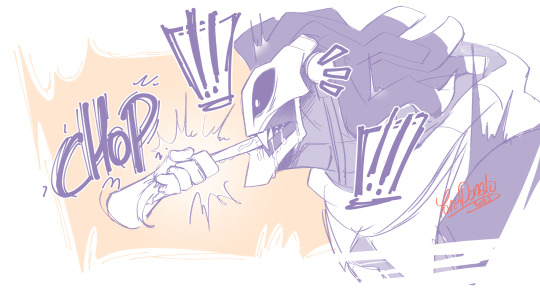
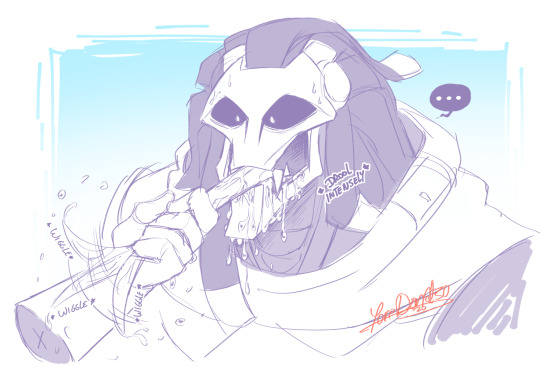
My contribution about Ramattra with a mouth/tongue/big teeth (largely inspired by the @shadeyenova‘s work - which has also inspired @zetomeri (their twitter))
#Overwatch 2#OW#Ramattra#The Husbanbot#Fanart#My headcanon#especially in relation to the ''gimmicky''#I talk about his mouth#Already sometimes he reminds me of a little gray when I draw his head#But here he looks more like an Alien/Xenomorph#Particularly on the first sketch#Sooo scary#but too sexy#Hello monsterlovers !#Annnnnnnnnd I can't be serious more one minute and I'm imagined this stupid situation#Chop/grap his tongue create a strange reaction:#It makes him drool a lot and his tongue moves by itself - like a snake#For the ''saliva'' - it's a settings's problem and Rama knows it (inspired by a fanfiction)#For the tongue's ''autonomy'' it's not the same story#This intrigues the omnic much cause it shouldn't be possible#''It's not supposed to move by itself... By Iris''#For the person who graps Rama any fears#Who is it ?#N/Y ?#Sona ?#OC ?#Other OW's characters ?#IDK
301 notes
·
View notes
Text
damnnn Ponyboy glowed UP
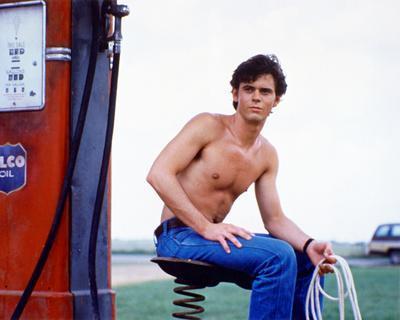
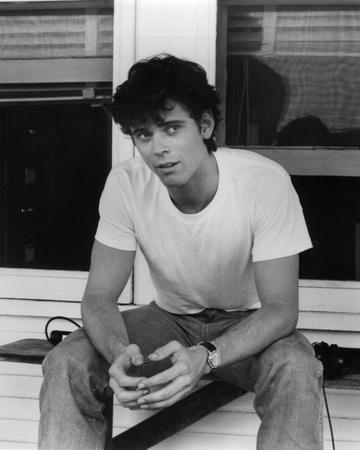
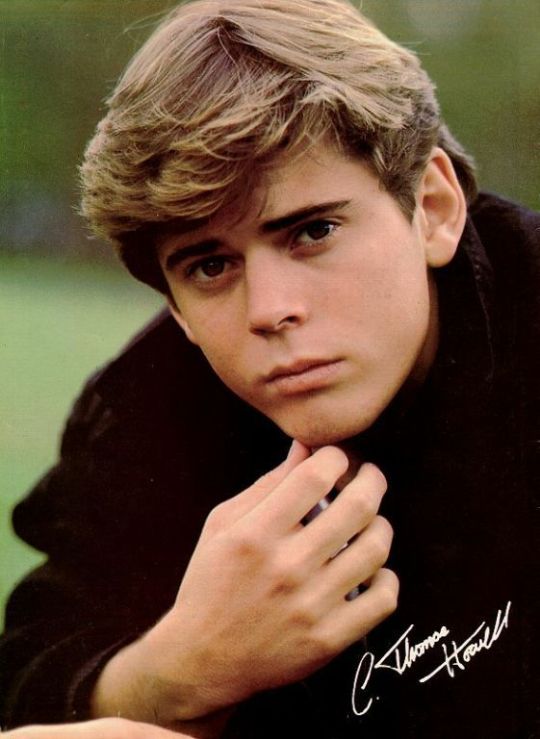
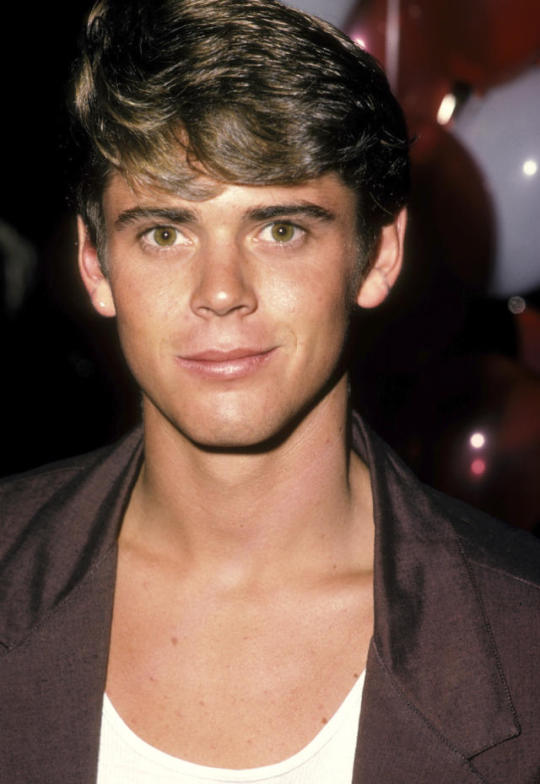
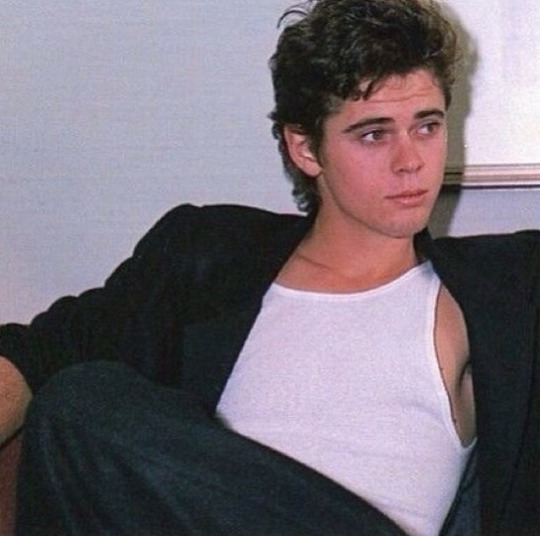
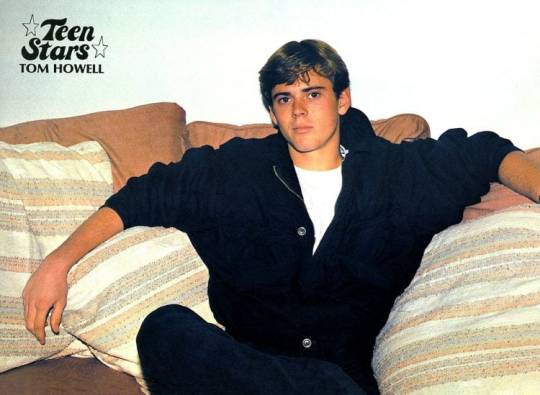
#he does take after bro#what i'm really saying is how could sodapop resist#making me crazy to think he looks like this is the future fic i'm working on#also side note. low key think i might possibly look sorta like him if I stay on t/get fms someday??#which is. intriguing.#those greaser boys#c. thomas howell#ponyboy curtis
58 notes
·
View notes
Text
I hope when putin finally dies I'll be the first one to make a destiel meme about it
#cmon dude you're so old and ill go meet with your parents already#just thought ab it and the mere possibility of it made me incredibly euphoric#actually I'm really jealous of americans#tf you mean you don't know who will be your next president. like you're really intrigued ab that? you're SPECULATING AB THAT HUH????#have never seen such atrocity in my life#< have been born in 2003#god knew I'd be too powerful if I hadn't been born in russia
16 notes
·
View notes
Text
that moment when saga fights against the darkness in her mind place and opens the door to leave and it starts to pan out—showing nothing but stars just like the Night Springs intro before she appears in the dark place’s new york. Traversing the void in between worlds just like her dad. cinema!!
#it’s also creepy. the implication that the dark place is either this other world/entity or something between worlds#it’s huge and nothing but (possibly) was shaped through contact by Zane/alan/artists#I can’t remember exactly the words but that one manuscript with Alan’s scratched out edits#where he called Cauldron lake a black mirror#that just by looking at it you’d know it was ‘too late’#the mountain being the site of a caldera. as casey says the opening to hell#anyways it’s very existential and terrifying#alan wake 2#saga anderson#ahhhghghhhhgghh I can’t stop thinking about the ending of this game#saga being an Anderson and a Door. being a seer and maybe even having the ability to traverse worlds.#door being everywhere and in between. all at once. fascinating#I don’t even know if this is the takeaway for that scene. the resemblance to night springs just intrigues me esp since the door manuscript#shows up right after this
30 notes
·
View notes
Note
Once again, you have done a wonderful analysis. I was the person who asked about the status of their relationship in Dreamland and Arcadia. 👏 great work!
I don't know if you have been asked this before, but I am going to ask anyway.
If you were to teach a class on the Xfiles for critical thinking and analysis, how would you want to structure the course? What episodes would be your "go-to" and what aspect of analysis would be your focus? Where would be a good starting point for the uninitiated?
You offer enough evidence that the show can be used for film analysis, writing, critical thinking, argumentation, creative writing, etc., so it is very plausible to use the XFiles as a medium to get students, or just the everyday person, motivated to think in ways that they may not normally practice.
I am inspired by your analysis of the asks that you share with your audience.
I think this my answer is both simple and complex, depending on which angle you want to tackle.
Simply: The X-Files is a masterclass in failure; and I mean that quite neutrally. There were cracks embedded in the foundation since Season 1-- a lack of show bible, a lack of narrative cohesion, a lack of attention to important detail, a lack of conclusive vision despite the aspirational visions-- that deepened with each new mystery box, each new twist, each new "the truth is out there, but it's not the truth we said it was a week ago, this time it's different" bend. Even more simply put, it is a deeply broken, deeply flawed series because its premise-- a shadowy conspiracy that cloaked alien interference and abductions-- was probably never intended to be more than that. But each new idea was more tantalizing than the last; and the more the show explored new territory, the more it sketched out an inescapable map. And soon, there was no new place to run.
Complexly: The X-Files is a masterclass in failure because despite all its faults, its flaws, its frailties, its downright ham-fisted or shocking plot points, the crew's talent was insane.
Not just David and Gillian-- though their chemistry's the stuff of legends-- but Mitch Pileggi, Nic Lea, the returning and supporting actors, the writers, the directors, the costume designers, the behind the scenes people, everyone poured their heart and soul and best into this series (until Season 7, which drained everyone, on and off set, of their investment.) It could, should have been so much worse-- it could have been canceled after its first season, it could have been canceled after the first few episodes, it could have been canceled after the ending in Season 1. Yet, in spite of DD and GA's green acting, and the more fixed direction, and the odd angle or odd script moment or odd lighting choice, there was talent-- sheer undeniable talent-- that was thrown in... maybe not everyday, but most days. And even more complexly, Chris Carter-- for all the faults that can be levied at his later work or behavior towards long-time friend Gillian-- fostered that talent. He was a generous executive producer; and once he formed loyalties, he stuck to them. In all the past interviews I've read, his writers and actors and crew admired his work ethic and trusted his judgment. And, while it wasn't the best judgment to guide the juggernaut of this immense series, he handled immense, buckling pressure so well that, by and large, he passed himself and his writing off as the stuff of legends... until, of course, it inevitably blew apart and plunged downward. But that's a risk he took; and the show did incredibly well while it soared.
Putting the two together: if I were to use this show as a teaching tool, I'd divide it into segments: the MOTW and the mytharc. The MOTW is where the show shines brightest, and what it's most remembered for by the vast majority of its viewers (and the populace.) Here, I could prove what incredible talent and dedication and drive can do: what generosity and fostering of ability, what openness to ideas, what creativity pushed to its max would inspire. How Squeeze-Tooms succeeded but Pusher-Kitsunegari failed; how to handle a skeptic-believer dynamic believably; how one show contained a multitude of tones, and played with them expertly (from drama to horror to sci-fic to comic to romantic to adventure to etc.); how to sensitively (or try to) push forward an idea that needs to be solved, in our world, without choking the audience with moralistic spoon-feeding. How and why (and when) a show can do all these things in one breath and utterly embarrass itself in another (looking at you, Fight Club.) That would then lead me into my second point: what the consequences of that would look like-- scripts written the night before (perhaps even the day of) filming; actors and crew pushed to their exhausted limit; one man creating more and more and more shows-- because he doesn't trust his first one will go on forever-- instead of focusing that incredible drive and effort to cleanly outline his pet project. Lastly, I'd shift into the perfect demonstration of The X-Files's rises and falls: its mytharc How the MOTW idea existed, in its infancy, in the Pilot; that the convoluted, ever-evolving plot didn't take shape and fly until the scope of ideas grew greater and greater; how that spawned an incredible mythos (or the potential of an incredible mythos); and how that mythos, for the most part, carefully danced a line that could have enraged many different factions of society and many different points. An elegant, slimmed conspiracy, at first, that took time to highlight important issues-- government overreach, abuse of power, coercive or vindictive control-- until it devolved into trite statements, repetition instead of invention, without firmer substance. Until the writers didn't have any land left to explore, turned around, and realized they'd flown into a corner. Then they threw a smokescreen-- a new tragedy or drama onscreen-- and hoped the audience would be blinded to the trick, once again. And, ultimately, how that lack of trust in the audience was a greater sin than their ability to finish the show satisfactorily.
If I were to step back, though, I think The X-Files could prove any point you want to prove: the struggle of the artistic vs. the executive, the reality of expectation vs. creative vision, the high of a meeting of minds between an ideas man and his audience, the impropriety of expecting fan loyalty yet shoveling them slop, the deevolution of a beloved franchise through disengaged interest and floundering quality, the importance (the sheer, indisputable importance) of writing well if nothing else, etc. etc. etc. I don't think I'd get into the Chris Carter issue, though. That area of drama is locked away from all but the most interested (in my case, over-invested); and it wouldn't be productive to bring into a classroom, seminar, or what have you. Unless, of course, I were teaching psychology. ;))))
Personally, I would divide the show into its sequential leaps forward: the time Chris Carter insisted on casting David and Gillian for their chemistry; the time Morgan and Wong pitched the show's first creature episode; the time Rob Bowman insisted on trying something different while directing; the time DD started writing, then directing, under the show's tutelage; the time GA wrote out her own script and directed it; the time Kim Manners or Rob Bowman or Vince Gilligan (or Spotnitz) pushed for overtly romantic moments between Mulder and Scully; the time 1013 and the show's theme and the UFO poster and the smoking man became international iconography, etc. All of these elements echo back to Chris Carter as a competent helmsman, and showcase him (and the show) at his best. Then, I'd pivot to the creative toll: the time crunch, the stress, the media speculation, the lack of privacy or a life, the ever divided attention-- that the most glamorized years of the show were also the most brutalizing (FTF and Season 5 filmed consecutively; and back to back with Season 4.) Finally, I'd focus on the sudden tone shift, pivot, and recovery of Season 6, 7, 8, and some parts of 9; and how each of the last three seasons suffered from the same fate: fresh new mysteries, failed follow-through, and catastrophic fatalities until the writers hit the emergency "Reset" button again. And that that pattern continued, irrevocably, for a movie and another two years.
But most importantly: I'd use any scene, any episode, any season to prove that all this profound effort-- time, blood, sweat, and tears-- can create giants... and can tear them back down when the foundations crack and give way. Until, in short, the writing, the one aspect holding everything together, falls apart. And without the writing, there is no final act, there is no happy landing-- there is only a man caught in the act, reprimanding you for looking behind the curtain.
Hope this helps! :DDDDD
#asks#anon#took me a bit!#this is a little all over the place#but I wanted to be as broadly thorough as possible#xf meta#mine#thoughts#this was such an intriguing question-- thank you! :DDDD#couldn't think of specific examples... probably because the show itself is so segmented#I could teach different courses on it forever and ever#or at least a very long time ;))))
11 notes
·
View notes
Text
really dont like any of nowi’s vanilla game supports what if i just married her to anna
#ann plays awakening#i dont even know if thats possible i havent recruited anna yet#but it is a little tempting#normally i pair nowi with donnel which is like. fine.#its probably the least worst of all the nowi supports in terms of how i feel after#i used to really like her with ricken but their ending made me so upset i never did it again#anna!nah sounds intriguing…#is that a thing has that ever been a thing probably not#ohhh why couldnt nowi just. just adopt. GOD#marrying her to anna doesnt fix my distaste for nowi supports but its something new. fresh.#red head nah is also just very nice. i do judge pairings based off of hair color btw
16 notes
·
View notes